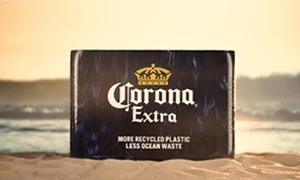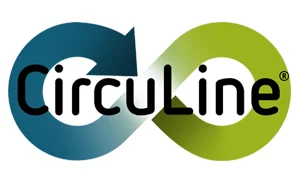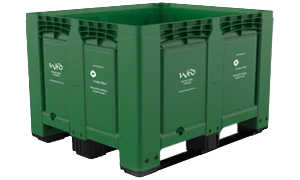Schoeller Allibert’s New Year’s resolution: to meet and exceed your expectations!

Contact us
Get in touchNew year is a time for resolutions. For starting to do things differently, and better than before. At Schoeller Allibert, there’s one thing that won’t change: our commitment to providing best-in-class returnable, reusable and recyclable plastics in the packaging industry. But this we promise: we will continue to improve and innovate, and our solutions will meet and exceed what markets and society demands of us. Our track record speaks for itself. And we look forward to adding to it in 2023!
The new year is a big one for the packaging industry. The EU is adopting a new Regulation for Food Contact Plastic Materials. This is part of the European Green Deal, and its promise to end wasteful packaging, boosting re-use and recycling.
Product loops
One key element of the new Regulation is the introduction recycling from product loops in a closed and controlled chain. This would mean that manufacturers like Schoeller Allibert would buy back old crates from a customer, then recycle them into new crates, but only for the same customer and intended use. Meaning old bread crates become new bread crates and old fish crates become new fish crates, but not vice versa.
The Regulation will have major consequences for both consumers and for the industry.
For the consumer, it will
ensure that reusable packaging options are always available;
limit overpackaging; abolish unnecessary packaging; and
provide clear labelling to support correct recycling.
For the industry, it will
create new business opportunities;
decrease the need for virgin materials; and
put the packaging sector on course for carbon neutrality by 2050.
For the EU as a whole, the new Regulation will effectively reduce our dependency on outside suppliers, and boost our recycling capacity.
After a transition period of six months, the Regulation will take full effect on 1 July 2023. This gives time to all industry players to adjust their processes and apply for the new permits. One thing is for sure: Schoeller Allibert will be ready. Why? Because, despite the Regulation’s new focus on closed product loops, its core principle remains totally aligned with ours.
Opposite effects
And this principle is that, contrary to widespread prejudice, there are actually two totally different types of plastics, with entirely opposite effects in terms of sustainability.
Consumer plastics are the single-use, one-way products and packaging that end up in the environment in large volumes, polluting and damaging the environment. This is a major, long-term problem.
On the other hand, we have containers, pallets and other packaging and logistics products made from returnable, reusable and recyclable plastic. These solutions reduce or even avoid waste.
Ironically, it is the durability and longevity of plastic – the core of the problem in the case of single use – that becomes the advantage for plastic returnable packaging (RTP). The fact that RTPs can be reused and recycled elevates their sustainability well above that of non-plastic, non-returnable packaging.
It is this principle that we at Schoeller Allibert apply in all our efforts. It is why we strive, when possible and if appropriate, for the maximum amount of regranulate (i.e. repurposed old packaging) in our new products.
In 2023, we will continue to pioneer this practice, which in the past has allowed us to develop innovative and award-winning product lines such as the Corona crate, CircuLine® and our WFO box.
The Corona Crate
Developed together with AB InBev, the world’s largest brewing group, for one of its beer brands, this 20-pocket beer crate won the award for ‘Best Environment-Friendly Packaging’ at the 2022 World Beverage Innovation Awards.
Each of the crates consists of at least 91% recycled plastic, with at least 20% coming from maritime industry waste (e.g. fishing lines, nets and ropes). All crates are 100% recyclable, allowing the beer brand to go from a linear to a circular plastic waste stream. But the crates are more than sustainable: they’re designed to be user-friendly, and visually attractive thanks to a unique marbled design.

CircuLine®
Schoeller Allibert’s CircuLine® range of products contain at least 30% recycled plastic - reducing virgin plastic consumption and consequently enhancing the re-use of the earth’s natural resources to their full extent.
CircuLine® provides a simple way for businesses to reduce the overall environmental impact of handling and logistics through the supply chain, without compromising on performance. This brings reduced supply chain costs and reduced plastic packaging tax costs, which have already been introduced in the UK and will follow across Europe soon.
The following Schoeller Allibert product ranges are available in CircuLine®: rigid pallet containers (RPCs), foldable small and large containers (FSCs and FLCs), pallets, stackable and/or nestable containers, beverage crates, and pails. Together with our Innovation department we are constantly enlarging our CircuLine® product portfolio through extensive testing.

The WFO box
The WFO box took more than 2.5 years of research, but the result is something Schoeller Allibert is particularly proud of. Developed in collaboration with Waste Free Oceans (hence the name WFO), the high-quality box is produced using a substantial share of recycled fishing nets – not just an upcycling success, but also a major victory in the fight against maritime pollution.
These are just three examples from Schoeller Allibert’s arsenal of solutions for sustainability. The company puts serious amounts of time and effort in producing new and improved generations of products. Because they’re not just more sustainable: they’re also lighter, smarter and more efficient. Because sustainable products only help reduce waste and carbon footprints if they also reduce cost and inefficiencies.

One ton, one tree
To demonstrate to the industry and its customers that Schoeller Allibert is serious about sustainability, the company focuses on more than the plastic from which is products are made. True sustainability requires circularity. That is why Schoeller Allibert has pledged to plant a tree for each ton of crates its customers sell back to the company.
Those crates will of course be recycled into new ones. And those trees will be added to what by now already is a substantial global forest, consisting of 5,200 trees across four continents, totalling 5.4 hectares and equivalent to 878 tons of CO2 captured.
In 2023, Schoeller Allibert’s global forest will continue to grow. We will continue to recycle old crates (and new plastic waste) into new crates, which in turn will be reusable, returnable and recyclable. And we will add to our list of award-winning, innovative product lines.
This is our resolution, and we’ll stick to it: in this New Year, more than ever, our products will benefit both the success of our customers, and the sustainability of our planet!
Contact us
Get in touchContact us
Inspiration
Related
relevantItems.news.intro
Navigating EU Sustainability Regulations in Transport Packaging—A Roadmap for Compliance and Opportunity
We’re thrilled to introduce our latest whitepaper: New EU sustainability regulations and their impact on packaging. Designed as your essential resource, this whitepaper breaks down the complex, changing landscape of EU s...
Read newsHow we’re helping reduce plastic pollution this Net Zero Week
Chemicals and plastics manufacturing accounts for
Read newsMagnum Optimum Hopper® 1208, dispensing excellence for the beverage industry
Schoeller Allibert developed approximately 20 years ago the new foldable format, which has become a global standard in many sectors. Following the successful introduction of the Magnum Optimum Optishute® and Magnum Optim...
Read news

